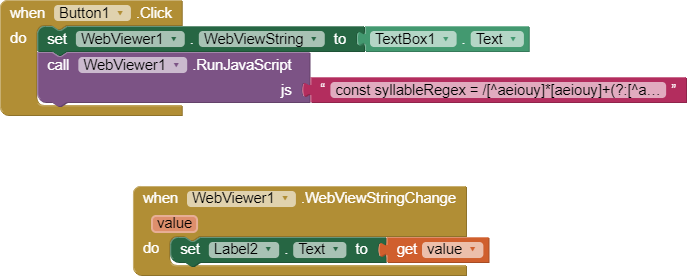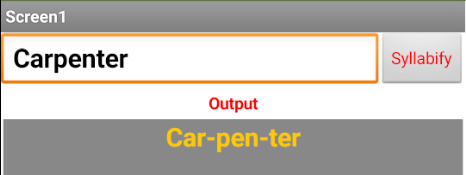This might give you some ideas....
it doesn't have to be about Google Sheets or SQLite, the processes are similar for most requirements....
This might give you some ideas....
it doesn't have to be about Google Sheets or SQLite, the processes are similar for most requirements....
With javascript and AppInventor it can be done quite easily.
Just use a regez inside a script.

Syllables_Divide.aia (2.1 KB)
The power of Javascript
Hmmm, not working here in companion?
I tested in companion on Android 11 and Android 10 works fine
Image Is screenshot of companion
Works OK (companion) on real device, Android 12, but not on my genymotion Android 10. Don't know why, javascript usually runs OK, I'll keep digging...
[EDIT] Doesn't work with customWebView either, so there must be a glitch in the emulator somewhere for regex.
[EDIT 2] Fixed it  It wasn't the regex, but the .replaceAll javascript function:
It wasn't the regex, but the .replaceAll javascript function:
![]()
replaced it (excuse the pun) with
![]()
and it works 

Is it possible to apply the regex to your regex extension, so one could build a procedure using just blocks?
const syllableRegex = /[^aeiouy]*[aeiouy]+(?:[^aeiouy]*$|[^aeiouy](?=[^aeiouy]))?/gi;
You are right.
Android webview doesn't support not standard
ECMA script and replace all function Is a prototype function
.replaceAll works in modern browsers and in Android 10,11,12 on real devices, it just may not be backwards compatible with older devices...
In Spanish, syllabic separation is a bit more complicated, since many words have vowels with accent marks.
I have used this JavaScript code to get the Spanish syllables:
https://github.com/nicofrem/silabajs/blob/master/silabajs.js
Syllables_Divide_v2.aia (8.6 KB)
BTW, what is the hyphenation of the word ridiculous, ri-di-cu-lous or ri-dic-u-lous?
https://www.silabas.net/index-en.php?lang=%2Findex-en.php&p=ridiculous&button=Hyphenation
I would say this one (which Marco's algorithm returns)
Try rhythm or righteous![]()
sorry I don't understand, do you want a block with this pattern? the MATCH or REPLACE function not working ?
edit: it's working:
I couldn't get it to work at first, but realised some editing of the regex was required:
[^aeiouy]*[aeiouy]+(?:[^aeiouy]*$|[^aeiouy](?=[^aeiouy]))?
worked for me :)
wo0ow thank you so much nice workaround , just doing visible false for webviewer and works perfect ,
Some more interesting results.....
ma-ry -had- a -lit-tle -lam-b it-s flee-ce -was- whi-te- as- snow
the -quic-k brow-n fox- jum-ped- o-ver- the -la-zy -dog
It ain't no better than rhy-thm ![]()
Thanks
I tested the script with a list of 100 words with a result of 90 correct results.
however each language has its own rules (for example in Italian we have diphthongs with groups of three vowels) which make a 100% reliable algorithm impossible
The code for Spanish that I linked in #14 works fine for Spanish, the same code makes some mistakes in Italian: mo-stra, na-sco, se-gno, pe-sca, pe-sce, guèr-ra... maybe you are interested in modifying it.
I saw your code that with some corrections works well also in Italian.however each language has its exceptions which make it impossible to develop a 100% secure algorithm.without a database support.
I am not knocking it, I think for general use and 95% of situations, this is an excellent solution 